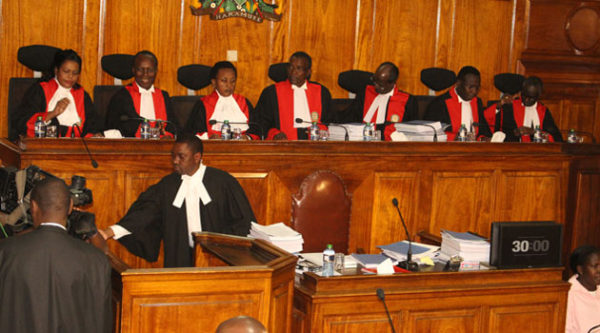BY SAM ALFAN
Some 16 months have lapsed Supreme Court judges promised to give their verdict in case a matter where British American Tobacco (BAT) challenged sanctions imposed by the government on cigarette manufacturers and importers, to safeguard public health.
The apex court completed hearing the case on April 26, 2018 and promised to deliver their decision on notice. The appeal by BAT was heard by Chief Justice Maraga, Deputy CJ Philomena Mwilu, Justices Smokin Wanjala, Njoki Ndungu and Jackton Ojwang.
The habit of smoking in public is creeping back despite the ban by the government on ant-smoking.
In February 2017, BAT lost their appeal seeking nine months to implement health warnings contained in the 2014 Tobacco Control Regulations, which took effect in September last year.
A three-judge bench of the Appellate court held that the regulations by the ministry of Health satisfied statutory and constitutional requirements since their enactment was preceded by exhaustive consultations with all tobacco industry players and public participation.
The Appellate bench upheld the decision made on March 24, last year, by High Court Judge Mumbi Ngugi giving the green light to the Health ministry to fully implement the legal provisions.
In the second appeal, Attorney General urged Supreme Court to dismiss the case and penalize the company for wasting judicial time.
“This court should dismiss and penalize the BAT for wasting precious judicial time and clogging the rights of genuine litigants that are kept at bay,” urged the A-G.
Senior State Counsel Mohammed Adow told the court that tobacco use and consumption interferes with vital organs such as the brain, lungs, heart, liver and kidney and causes diseases, disability and death and it affects the health and lives of the present and future generations.
“Tobacco control and regulation is a global practice. Kenya being a respectable member of the international community and a party to WHO FCTC cannot be exceptional,” Adow submitted.
Mr Adow told Supreme Court the purpose of the regulation is to protect the global citizens, those who smoke and those who do not, from the harmful effects of tobacco consumption and use by informing them the effects of the same as per our bill of rights.
This was during a hearing following their appeal at the Supreme Court challenging the court of appeal’s decision that dismissed their petition to stop tougher tobacco control measures that included graphic warning and annual levies to treat cancer patients.
Through lawyer Kiragu Kimani, BAT said the government did not follow the proper regulatory process.
“The appellant has no difficulty of being regulated provided the regulation is in accordance with constitution, in reasonable and evidence based”, Kiragu said.
He told chief justice David Maraga that they did not appeal to revisit the regulation.
Kiragu accused the health CS that he failed to conduct adequate public participation and stakeholder’s consultation.
“Public participation cannot be taken lightly. Those who were involved had actually raised concern and had recommended that the process should be repeated. There was no impact assessment that was conducted”, BAT said.
He said growing and manufacturing of cigarette is a lawful business and conducted by many other countries and a solution has been introduced as a tax though it’s not clear how this will be used as compensation.
However the Health ministry through state counsel Mohamed Adow successfully argued that BAT had already complied with the regulations as cigarette packets with graphic warnings are already in the market.
Adow said the court is justifiable to limit the regulations and urged the court to reject the appeal and uphold the regulations because it will help in the health of citizens of the country.







